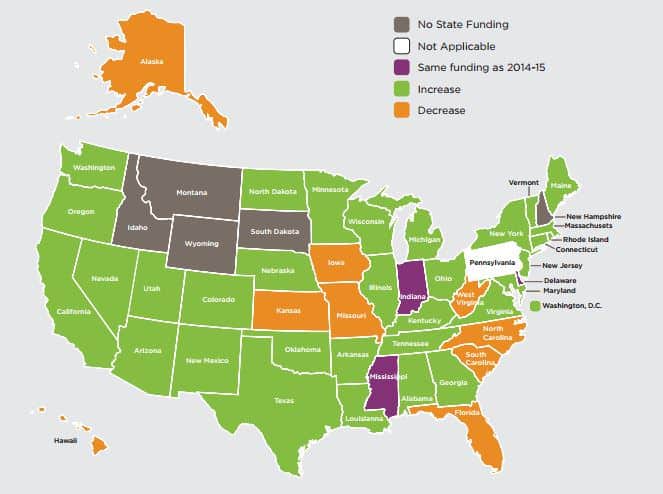

Back in June, when the General Assembly had yet to complete the biennial budget, I wrote this observation about state support for pre-kindergarten programs: “after a period of briskly jogging forward, North Carolina has lately been running in place in its support for early childhood education.”
I’m sorry to say I told you so. A new 50-state review by the Education Commission of the States reports that 32 states – 22 with Republican governors, 10 with Democratic governors – increased funding for preK programs in the 2015-16 budget year. North Carolina is not among them.


The ECS lists North Carolina among the nine states that decreased funding. Three states held their preK support constant, and five do not provide state funding for preK.
In examining the ECS analysis, I would say that North Carolina could just as well fall into the “stayed constant’’ states as among the “decreased funding’’ states. The ECS reports that state funding for the preK program declined from $144.9 million in 2014-15 to $144.2 million in 2015-16 – a reduction of approximately $750,000, less than one percent. Money for the preK program comes from a combination of state general revenues, lottery proceeds, and a modest amount of federal funds.
The ECS did not count SmartStart. But if it had, North Carolina would not have fared better in the rankings. As the Public School Forum of North Carolina recently pointed out, state support for SmartStart has remained at $151 million for four consecutive fiscal years.
While North Carolina has been running in place, the ECS reports that “total state funding for preschool programs increased by $767 million to a total of nearly $7 billion” – a 12 percent increase from the previous fiscal year. New York instituted universal, full-day pre-kindergartens with a $340 million appropriation, while Texas increased its preK spending by $100 million. Like North Carolina, Virginia and Tennessee remained relatively flat, while Georgia increased its spending by $7 million and Florida reduced its spending by nearly $7 million.
Even had the ECS put North Carolina among the “stayed constant’’ states, such a finding would have come as another smidgen of tarnish on the reputation of North Carolina, a state not so long ago at the forefront of the movement toward pre-kindergartens for four-year-olds.
Government appropriations offer a measurement of a society’s commitment to a cause, a venture, an objective.
Thus, the ECS report gives voters a way to hold their elected officials accountable, and defines the challenge ahead.
One reason to expand preK opportunities for North Carolina children has to do with hitting the objective set out by the Republican legislative majority in its legislation to have all students reading to achieve by the end of the third grade. To reach that objective requires appropriate instruction in kindergarten, first, and second grades. Just as kindergartens used to prepare youngsters for the first grade, it takes preK to prepare students for a more academic-focused kindergarten.
The ECS report offers a wider-angle rationale, drawing on its accumulation of a large body of research evidence. Indeed, the ECS paper scrupulously notes that some studies, including a recent Tennessee study, suggest that the benefits of preschool diminish as students proceed through schooling. Still, the ECS finds that the preponderance of research shows that “high-quality preschool programs promise impressive returns on investment…improving education outcomes, health effects and economic prosperity for children, families and the nation.”
“Research indicates that preschool is particularly important for low-income children because it has high potential to change a child’s trajectory,’’ says the ECS paper, which cites research that children from low-income families often enter school “several months’’ behind children from affluent families in language development. “This inequality continues to widen before school entry at age 5,” says the report, “leaving disadvantaged students up to two years behind their higher-income peers.”
For me, there is no self-satisfaction in having a reputable national education organization offer evidence that I got it right about North Carolina jogging in place, rather than continuing to lead the nation.
In offering preschool to young people who will form the citizenry and workforce of the near future, can the Tar Heel state get its mojo back?
A footnote: The Education Commission of the States, located in Denver, is approaching its 50th year of contributing to state and national education policy. One of its principal founders was former North Carolina Gov. Terry Sanford. After his gubernatorial term ended in early 1965, Sanford joined with John W. Gardner, then president of the Carnegie Corporation, to carry out ideas of James Bryant Conant, a former president of Harvard University. Sanford led the development of a “Compact for Education,” which resulted in the ECS launch in 1967.


